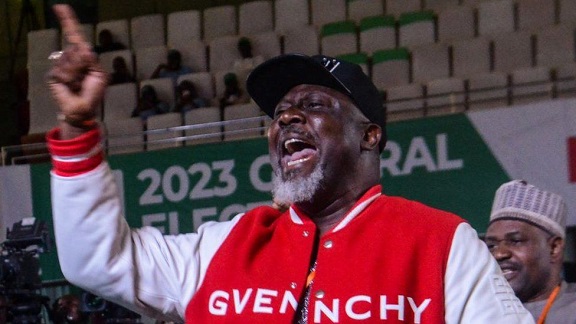Opposition parties have walked out of the venue where results from Nigeria's tightly contested presidential elections are being announced.
The main opposition Peoples Democratic Party (PDP) and the Labour Party have claimed there is a lack of transparency with the new electronic voter system.
This is the first national election where an electronic device has been used to accredit voters.
The election commission has denied the opposition parties' complaints.
The Independent National Electoral Commission (Inec) chairman Mahmood Yakubu said the announcement of results would continue.
The PDP representative at the election centre in Abuja described the process as fraudulent, and accused the ruling All Progressives Congress (APC) of colluding with Inec, while the Labour Party asked for the announcements to be suspended, or for the election to be cancelled and rerun.
The APC, whose candidate Bola Tinubu has established an early lead from results announced so far, said those dissatisfied with the results should go to court, and that the parties should first let the process run its course.
With about a third of the 36 states officially declared, Mr Tinubu has 47% of votes cast, as opposed to 27% for Mr Abubakar, and 22% for Mr Obi. However, most of the results in so far are from the south-west - Mr Tinubu's stronghold - so the final outcome remains unpredictable.
The ruling All Progressives Congress (APC) and the PDP have dominated Nigeria since the end of military rule in 1999 but this time, Mr Obi from the previously little known Labour Party is expected to mount a strong challenge to the two-party system. He has the support of many young people, who make up a third of registered voters. There are 15 other candidates.
A candidate needs to have the most votes and a quarter of ballots cast in 25 of the 36 states plus Abuja to be declared the winner.
Otherwise, there will be a run-off within 21 days - a first in Nigeria's history.
Bina was hit with a sharp object while she was waiting to vote in Lagos
Mr Obi has caused a major upset by winning in Nigeria's biggest city, Lagos, narrowly defeating Mr Tinubu in his heartland.
Mr Tinubu is a former governor of Lagos state and hopes to use his record there as the basis of his presidential bid.
The ruling party candidate has accepted defeat in Lagos and said that as a democrat, he was bound to accept the outcome of any election.
"People have a right to vote for the candidate of their choice," he said in a statement released by his campaign team.
He also appealed for calm from his supporters after his loss, following reports of violence in parts of Lagos against traders from the Igbo community, like Mr Obi.
Mr Obi's victory in Lagos, though a major breakthrough for a third-party candidate, is not necessarily a huge surprise. The city is home to many young, educated people, as well as a large Igbo population - all groups widely seen as backing his campaign.
He has also won in his heartland eastern Enugu state.
What is the problem with electronic system?
Inec had assured Nigerians that the electronic voting system, known as Bvas, would enable it to transmit election results direct from polling stations to improve transparency.
However, there were complaints on Saturday from many voters that electoral officials refused to upload the results at the polling stations as they are supposed to.
Officials complained of a lack of internet in some places to upload the results, but voters have shared videos and images shared where Inec officials refused to upload the results.
Inec chairman Mr Yakubu has apologised for the inability of the commission to upload most of the results as promised, saying that a surge in traffic caused glitches.
BBC





